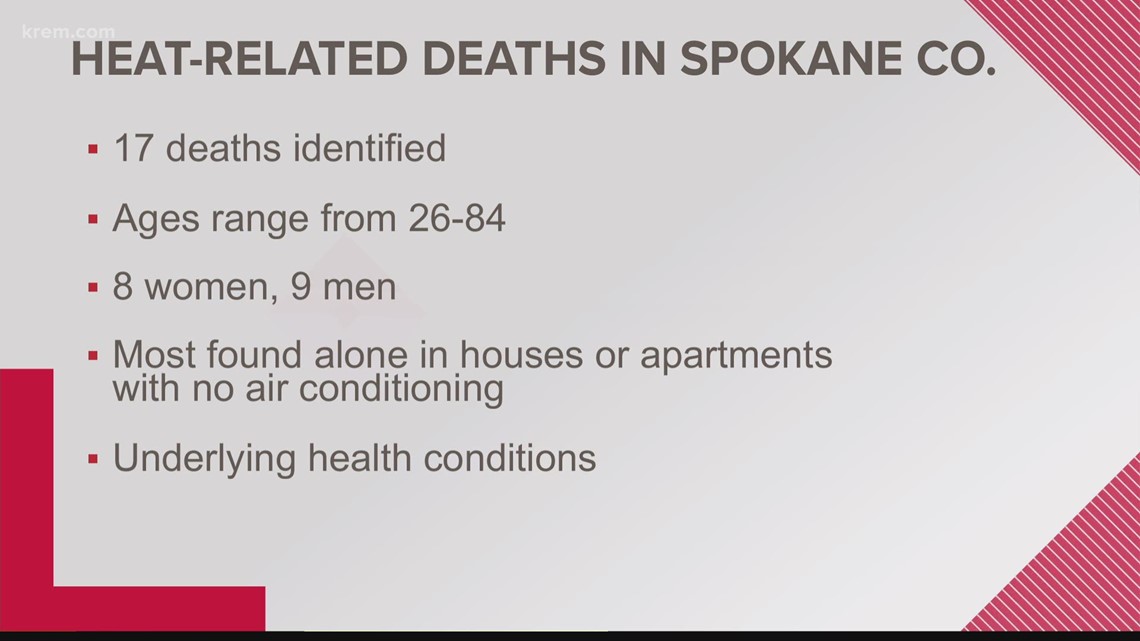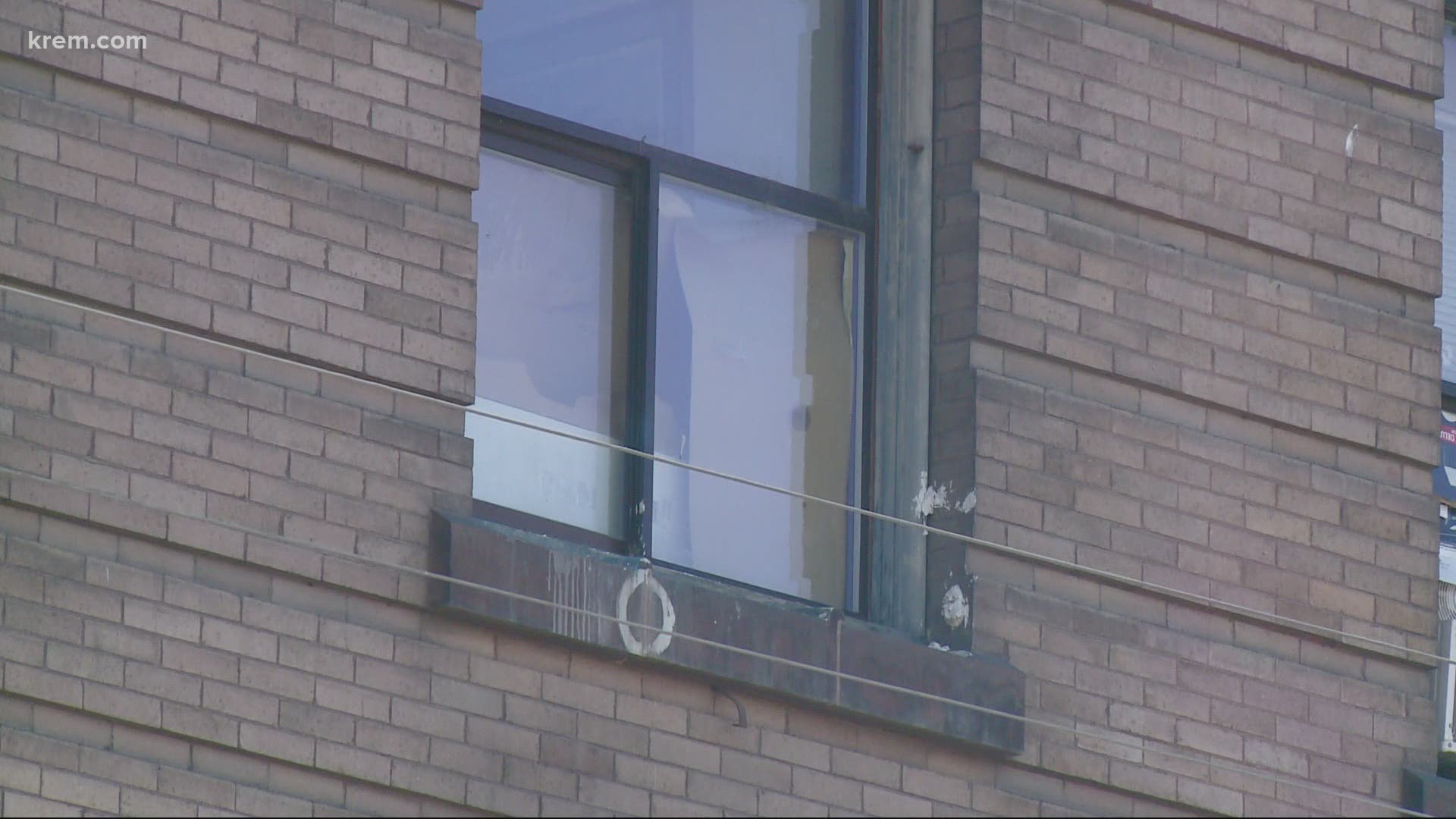SPOKANE, Wash. — As the death toll from the Pacific Northwest heat wave continues to climb in Spokane County, community members say there is a lack of accountability.
Three more probable cases were identified Thursday morning, onto the 17 announced Wednesday. The deaths were all announced in the last eight days. The deaths happened on or after July 1. Webley said for comparison, Spokane County reported 13 heat-related deaths in total between 2015 and 2020. These deaths are just a portion of the 78 people in Washington state who likely died because of the historic heat wave.
Most people who died due to the heat were found alone in houses or apartments without air conditioning, according to Spokane County Communications Manager Jared Webley.
"And you know what, none of us was smart enough to put $1 amount on the value of life," City Councilwoman Betsy Wilkerson said.
Before the heat wave fully hit Spokane, Wilkerson warned that the city was nowhere near prepared for the heat. She worried that people would die. She was right.
"Could we have done a better job?" she asked. "That was somebody's mother father, sister, brother, aunt or uncle. Could it have been preventable?"
She answered her own question.
"That's the question we have to ask ourselves as leadership, what could have been prevented with a plan in place?" she added. "These are the deaths that are most preventable."
On Thursday morning the medical examiner wrote on its website, "There are 20 deaths wherein circumstances suggest they may be heat related, although autopsy results are not yet available to confirm."
The people who died range in age from 26 to 84 and include eight women and nine men. Webley said many of the victims had underlying health conditions which made them more susceptible to heat stress. Some also had cognitive impairment or mobility problems that limited their ability to remove themselves from the dangerously hot environment, Webley added.
"I said last time, the Council is more than willing to financially fund whatever is required to keep our citizens safe," Wilkerson said. "We just need a plan, a plan where if this happens, we're not scurrying at the last minute."
Wilkerson was outspoken about her dissatisfaction with the administration's Looff Carrousel cooling center before it opened. The city will use the multi-purpose rooms at the carrousel as a temporary cooling center. This location was open from 11 a.m. to 7 p.m. starting on Saturday with a capacity of 72 people. It remained open for a few days, but closed when the temperatures dropped. The city provided 1,300 water bottles available at the centers. They were donated by Dasani and Coca-Cola, according to City of Spokane spokesman Brian Coddington.
"This is dangerous, this is deadly," she said in an interview with KREM 2's Morgan Trau on June 24, days before the heat wave. "And that's the last thing we want to see, somebody dying because we weren't prepared to meet the challenge."
Some of the victims were found in buildings where other people were also suffering from heat-related illnesses, according to Webley. Retired pastor and community activist Lonnie Mitchell said people living on the poverty line, yet still have apartments, are being left behind.
"A lot of people are being looked over because we're just not focused on serving people, for some reason," Mitchell said.
Wilkerson and Mitchell want someone to take responsibility, but the City said it doesn't fall on them.
"[Air conditioning,] that's an individual choice, and that comes with each individual home ownership or rental property," Coddington said. "That's a decision that those homeowners make."
Not everyone has the ability to buy an air conditioner, demonstrating Wilkerson's point of a lack of accessibility. A large percentage, 40-50%, of the population in Spokane doesn't have air conditioning, according to Coddington.
"[Helping provide air conditioners,] It's not something that we can do overnight, and we can have this good conversation and we have a solution, he said. "These are things that are years and years and years in the making and require a lot of thought and a lot of careful consideration to come to a solution that works best for a community of 210,000 people."
This is a challenging discussion, he said. Both Wilkerson and Mitchell agreed.
"We need to talk a lot more about how we get people to come out of their homes," Coddington added. "People are reluctant to leave their homes."


“Unfortunately, I expect that the true number of deaths related to this extreme weather event will probably be higher before the end of summer and once all hospital deaths are examined," Chief Medical Examiner for Spokane County Dr. Veena Signh said in a press release. "The high number of deaths for this region emphasizes the importance of all of us being aware of the signs of heat exhaustion and heat stroke, realizing how lethal these conditions can be, and checking on our neighbors, relatives, and friends to ensure that they are safe.”
Coddington wanted to remind those with health conditions can call Spokane transit so they can leave their homes and come to one of the cooling centers or air-conditioned businesses. There is also a help line at 211. When asked if anyone who had called the 211 line ended up dying, he said he didn't know.
The City has been evaluating new ways to address the problem of heat, he said. He is looking into potentially finding funding to make cooling centers and air conditioning more accessible. Wilkerson said that is a start.
"There should be something between all of our emergency management systems," she said. "And again, that will require preparedness."
Coddington added that yes, 20 people died, but 731 people were saved by the cities cooling centers. Wilkerson added that she will continue to push for the safety of everyone in the community.

